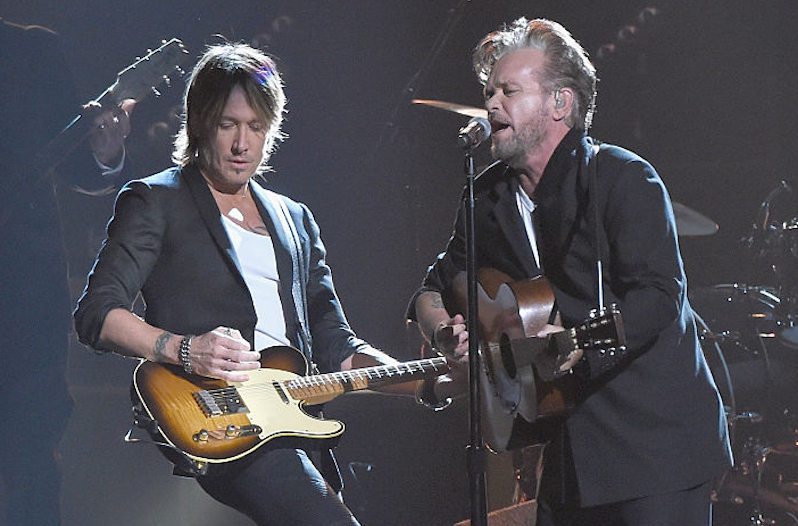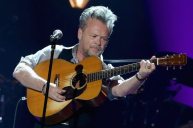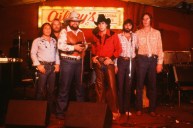[dropcap]A[/dropcap]t its core, Heartland rock is about common people. It's straightforward and populist. It's not difficult to see why so many country artists are drawn to the singer-songwriters and storytellers of the movement. For starters, many modern artists were raised on the likes of classic Heartland Rock records such as Bruce Springsteen's Born to Run, Tom Petty's Full Moon Fever and John Mellencamp's Scarecrow.
Videos by Wide Open Country
Part of what's so alluring about Heartland rock has been how ranging the songs can be. There's as many soaring anthems that have become uniting singalongs as there are sad intimate ballads that illuminate the struggles of rural and blue collar working classes. It's heartfelt, plainspoken and endearing.
Here are eight of Heartland Rock's most influential voices in country and Americana music.
Bruce Springsteen
Bruce Springsteen has been the poster boy for Heartland rock since its inception in the late '70s. Early albums like Born to Run and The Wild, the Innocent & the E Street Shuffle captured Springsteen's passion for the working class and blue-collar Americans. Songs like "Thunder Road," "New York City Serenade," and the ever iconic "Born to Run" made the urban backdrop of New York and New Jersey into characters themselves. He walked the fine line between romanticizing the bright lights of the city with bitter nostalgia that often showed the underbelly of the beast.
The Boss' albums of the early '80s, The River, Nebraska and Born In The U.S.A. are perhaps the most important of his career and his largest contributions to Heartland rock. Unlike previous efforts, the trio of albums were largely not about the optimism of youth. Springsteen's characters had morphed into down on their luck outsiders, hopeless criminals and restless small-town Americans. Even with the grand anthemic tones of Born In The U.S.A., Springsteen's characters are often damaged.
Springsteen Disciples: Eric Church, Will Hoge, American Aquarium, Steve Earle, Ryan Culwell
Tom Petty
While Springsteen gradually morphed into a storyteller driven by the working class American, Tom Petty's songwriting captured Americana with broad strokes that struck a nerve across the board. His sprawling anthems of "Free Fallin'," "I Won't Back Down," "American Girl" and "Refugee" are unflinchingly optimistic and vibrantly bright. Petty's straightforward lyrics gave way to a rise to raw simplistic, but effective storytelling. Petty's endearing charisma and swagger breathed life into the lovable losers and common folks who were spread throughout Wildflowers, Into the Great Wide Open and Southern Accents.
Petty Disciples: Dierks Bentley, Chris Stapleton, Tim McGraw, Thomas Rhett, LANCO
John Mellencamp
During the early '80s, John Mellencamp's rough and tumbling anthems of "Pink Houses," "Small Town" and "Jack & Diane" were as American as a slice of apple pie. Mellencamp's catchy singalongs perfectly painted growing up in rural America. There was always a slight sense of disillusionment, but never as bitter as Springsteen's raw take.
Mellencamp's nostalgic romanticism of rural communities surrounded by farmlands was earnest and sincere. He characterized Heartland as the last glimmer of hope in the American Dream. Recent albums such as Freedom's Road and Life, Death, Love and Freedom will slowly begin scraping away at those values. Rather than try and escape through consumership and materialism, Mellencamp takes a difficult hard look at what makes communities decay.
Mellencamp Disciples: Darius Rucker, The Wallflowers, Garth Brooks, Keith Urban, Zac Brown
Jackson Browne
While not as anthemic as some of his contemporaries, Jackson Browne's soft-spoken introspective songs often captured coming to terms with adulthood with uncompromising intimacy. Early songs like "Take It Easy," a Glenn Frey collaboration, "These Days" and "Doctor My Eyes" find Browne with a cautious optimism. With "The Pretender," Browne turns the tables with his take on blue-collar Americans. Rather than limited opportunities and the spread of unemployment, Browne highlights the struggle between materialism and going after the dreams of your youth. Browne's Running On Empty finds him loosely chronicling life on the road as a touring musician.
While often glamorized, Browne takes on boredom and despondency of road life. He doesn't just address the life of a touring musician either. Browne dives deep into the lives of those whose names aren't on the marquee outside the venues. The rigors of the road take its toll over time on everyone involved.
Browne Disciples: Ryan Beaver, Shawn Colvin, Buddy Miller
Bonnie Raitt
While never truly identified as a Heartland rocker, Bonnie Raitt's Nick of Time and Luck of The Draw added a refined smooth blues influence back in the movement in the late '80s. Songs like "Nick of Time" and "I Can't Make You Love Me" had Raitt at her most intimate and personal. There's a forthright honesty in Raitt's raspy, but gentle vocals. Like Browne, Raitt's songs aren't ever as anthemic in nature. Rather, they're scaled back finding a nice warmth and cozy middle ground that's rootsy in nature.
Raitt Disciples: Sheryl Crow, Mary Chapin-Carpenter, The Wreckers, Tift Merritt
Bob Seger
https://youtu.be/sQ0JTl2YFXQ
In 1968, Bob Seger's Ramblin' Gamblin' Man may have unofficially been Heartland rock's first album. It was a rowdy, bluesy bar room set of songs that'd help set the parameters for the sometimes cold, but always honest budding movement. In the late '70s, the raspy-voiced Seger really hit his stride with a run of albums that included Night Moves and Stranger in Town, two of the sub-genre's most rousing and impressive. With "Night Moves," "Main Street" and "Old Time Rock & Roll," Seger tapped into nostalgic memories of his youth. Rather than being sour for being on the back side of 30, Seger's maturity shines through. These bittersweet flashbacks soon became the standard for Heartland rock.
Seger Disciples: The Georgia Satellites, Cross Canadian Ragweed, Frankie Ballard, Parmalee
John Fogerty
https://www.youtube.com/watch?v=04KQydlJ-qc&feature=youtu.be
Like Seger, John Fogerty's Creedence Clearwater Revival albums of the late '60s helped mold the budding genre in its' infancy. While certainly protest songs inspired by the '60s, Creedence's "Fortunate Son" and "Who'll Stop the Rain" would add a dose middle and lower class realism into the mix with their anti-war messages. As a solo artist, Fogerty's Centerfield stands out as a Heartland classic. "Centerfield," a fun-loving baseball song that rivals "Take Me Out to the Ball Game," found Fogerty light-hearted and cheerful, a far cry from his Creedence days.
Fogerty Disciples: Wade Bowen, Alejandro Escovedo, Lucinda Williams, Brad Paisley
Eagles
https://youtu.be/IDdjZWn8l3g
The Eagles' early country-folk songs of "Take It Easy," "Peaceful Easy Feeling" and the ever lonesome "Desperado" all challenged what Heartland rock could be. While they certainly began as outsiders, the Eagles, along with Browne, J.D. Souther and Linda Ronstadt, they brought L.A.'s country-folk scene into the fold of Heartland. Their dynamic and warm harmonies would soon become as much a staple as Mellencamp's raspy anthemic choruses. With Hotel California, would soon become a blueprint for Heartland rock.
Though different in style and story, "Life in the Fast Lane," "New Kid in Town" and "The Last Resort" would show you didn't have to stay with a specific tone throughout. Don Henley's solo efforts in the '80s, specifically I Can't Stand Still and Building the Perfect Beast, would fall in line with the best of the decade. His iconic "The Boys of Summer," written with Petty guitarist Mike Campbell, would be a timeless classic for the Heartland movement.
Eagles Disciples: Midland, The Mavericks, Vince Gill, Clint Black, Travis Tritt




